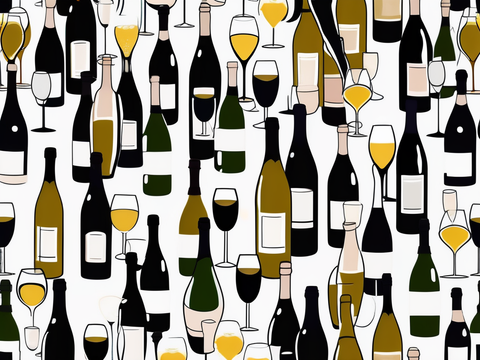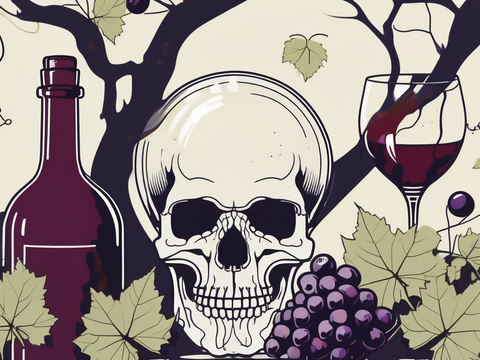Vodka, the clear and colorless distilled spirit, has long been revered as the go-to choice for many drinkers. Its popularity has transcended borders and cultures, earning a reputation as a versatile and pure spirit. However, upon closer examination, it becomes evident that vodka's rise in prominence is not always justified. In this article, we will explore the reasons why vodka is arguably the most overrated spirit in the market today.
Understanding the Popularity of Vodka
Before delving into the misconceptions surrounding vodka, it is crucial to comprehend why this spirit has gained such immense popularity. The history of vodka's rise in prominence can be attributed to a multitude of factors.
Vodka's origins can be traced back centuries to Eastern Europe, where it was initially used for medicinal purposes. The early production techniques involved distilling fermented grains or potatoes to create a clear, high-proof spirit. Over time, its production techniques evolved and it became a staple in the daily lives of the people in countries like Russia and Poland.
With the fall of the Iron Curtain in the late 20th century, vodka's popularity spread to Western markets, captivating consumers with its perceived purity and subtle flavor. The allure of this spirit lies in its versatility - it can be enjoyed neat, on the rocks, or as a base for countless cocktails.
The History of Vodka's Rise
As vodka made its way into Western markets, it quickly gained a reputation as a trendy and fashionable drink. Its association with Eastern European culture and the mystique surrounding its production methods added to its appeal. Vodka became a symbol of sophistication and refinement, attracting a wide range of consumers.
Furthermore, the globalization of the alcohol industry played a significant role in vodka's rise. As travel and trade between countries increased, so did the availability of different vodka brands. This led to a greater variety of flavors and styles, catering to diverse consumer preferences.
Today, vodka is not only enjoyed by individuals seeking a classic and timeless drink, but it has also become a favorite among mixologists and cocktail enthusiasts. Its neutral taste profile allows it to blend seamlessly with other ingredients, making it a versatile choice for creating innovative and flavorful cocktails.
The Marketing Machine Behind Vodka
Another pivotal factor that propelled vodka's popularity is its extensive marketing campaigns. Vodka brands have been successful in positioning their products as the embodiment of sophistication and glamour. Through clever advertising and strategic partnerships, vodka has created an aura of exclusivity that entices consumers and fuels its demand.
From glamorous celebrity endorsements to sleek and stylish packaging, vodka has mastered the art of creating a desirable image. The association with luxury and high-end lifestyle has made vodka a status symbol for many consumers.
Moreover, vodka's versatility has allowed it to infiltrate popular culture. It is often featured in movies, TV shows, and music videos, further solidifying its place in the public consciousness. This exposure has helped vodka maintain its popularity and remain relevant in a highly competitive market.
In conclusion, the popularity of vodka can be attributed to a combination of factors, including its rich history, versatility, and successful marketing campaigns. As consumers continue to seek new and exciting experiences, vodka's enduring appeal shows no signs of waning.
The Misconceptions About Vodka
While vodka's popularity is undeniable, it is essential to recognize the misconceptions that surround this spirit, which contribute to its overrated status.
The Myth of Vodka's Purity
One common misconception is the idea that vodka is the epitome of purity. While it is true that vodka undergoes extensive distillation and filtration processes, it does not necessarily mean that it is the purest spirit available. Other spirits, such as gin or rum, can also boast high levels of purity while offering a more diverse range of flavors.
The Fallacy of Vodka's Versatility
Another myth associated with vodka is its perceived versatility. While it is true that vodka can be mixed with a variety of ingredients, this does not necessarily make it a superior choice. Other spirits, such as whiskey or tequila, offer a complexity of flavors that enhances the drinking experience and allows for more creative cocktail creations.
The Lack of Complexity in Vodka
Beyond the misconceptions, one of the main reasons for vodka's overrated status lies in its lack of complexity compared to other spirits.
Vodka's Simplistic Flavor Profile
Vodka is renowned for its neutral taste profile, often described as "smooth" and "clean." However, this simplicity can be seen as a limitation rather than a virtue. Unlike whiskey, which boasts a rich tapestry of flavors from smoky and caramel notes to fruity and spicy undertones, vodka lacks the depth to truly captivate the discerning palate.
The Absence of Craftsmanship in Vodka Production
Unlike other spirits that embrace the artistry and craftsmanship of production, vodka often prioritizes quantity over quality. The mass production techniques employed by many vodka brands detract from the magic and dedication that goes into crafting spirits like gin or rum. This emphasis on efficiency compromises the overall experience and contributes to vodka's overrated reputation.
Comparing Vodka to Other Spirits
To truly appreciate the overrated nature of vodka, it is crucial to compare it to other spirits and understand the unique characteristics that set them apart.
The Richness of Whiskey
Whiskey, with its centuries-old tradition, offers an unparalleled richness and complexity that vodka simply cannot match. From the peatiness of Scotch to the caramel notes of bourbon, whiskey takes the drinker on a journey of flavors that transcends the limitations of vodka.
The Diversity of Gin
Gin, often overshadowed by vodka's popularity, is an incredibly versatile and diverse spirit. With a wide array of botanicals and flavors, gin provides a broad range of options for cocktail enthusiasts, allowing for a more nuanced and exciting drinking experience.
The Complexity of Rum
Rum, originating from the Caribbean, boasts a complexity that rivals even the finest spirits. The aging process and the influence of different climates lead to a vast spectrum of flavors, from the smooth and oaky notes of aged rum to the rich and fruity undertones of spiced rum.
The Future of Vodka in the Spirits Market
As consumers become more discerning and seek out unique drinking experiences, the future of vodka in the spirits market is uncertain.
The Potential for Craft Vodka
Despite its current overrated status, there is space for vodka to reinvent itself through craft production. By focusing on quality ingredients, small-batch distillation, and unique flavor profiles, craft vodka has the potential to reinvigorate interest in this spirit and provide consumers with a more authentic and memorable drinking experience.
The Changing Tastes of Consumers
Furthermore, as consumer tastes continue to evolve, it is likely that the demand for complexity and diversity in spirits will grow. This shift in preferences may result in vodka losing its hold on the market, as drinkers seek out spirits that offer a more elevated and sophisticated drinking experience.
In conclusion, while vodka's popularity cannot be denied, it is crucial to recognize the reasons behind its overrated status. From misconceptions about purity and versatility to its lack of complexity compared to other spirits, vodka falls short in offering the depth and diversity appreciated by discerning drinkers. As the spirits market continues to evolve, only time will tell if vodka can overcome its overrated reputation and secure its place amongst the truly great spirits.




